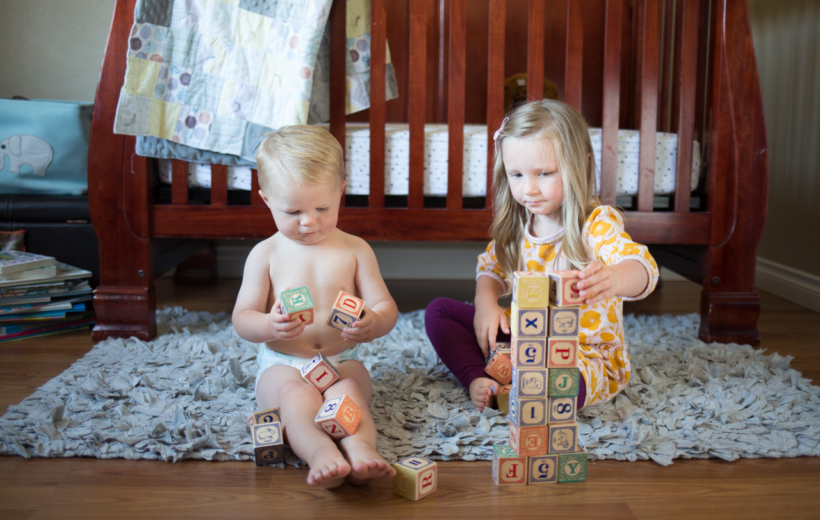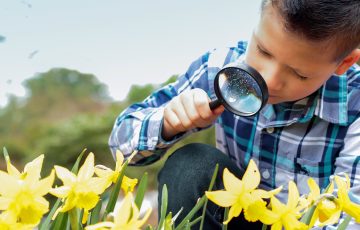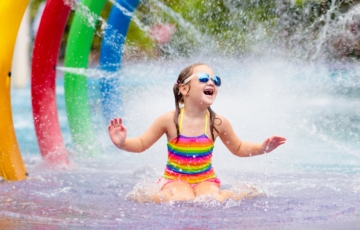
The spring of 2020 presented families with so many challenges. Parents were expected to work from home while taking care of their children, among other stressors. Daycares, activities, and playgrounds all shut down. These events led to many children entertaining themselves with more screen time.
Unfortunately, when kids are spending time on media (even if it’s “educational”), they aren’t talking or interacting with others. This lack of interaction can lead to lower language development and problem-solving skills.
With summer in full swing and quarantine lifted, it’s time to break bad habits that can be detrimental to your child’s health. Let’s focus on the most important activity in their life: PLAY!
Early development
Helping your child reach their full potential doesn’t require any fancy gadgets. The best way to promote healthy development is through good old-fashioned play time. Early learning and play are social activities that fuel thought and language development. Through playful discovery, children learn important skills like problem solving, collaboration, and creativity.
Types of play
Unstructured play
Open-ended play with no specific learning goal has many benefits. It helps kids find their own outlets for creativity and physical energy. Unstructured play also fosters social and emotional growth. Free play builds resiliency. According to experts, children who develop resilience boost the Seven C’s of:
- Competence
- Confidence
- Connection
- Character
- Contribution
- Coping
- Control
Traditional toys
Research shows that traditional toys, like wooden blocks, increase language acquisition over electronic toys. Social development relies on facial expressions, gestures, speech, and tone of voice. While toys with lights and sounds detract from social engagement. Playing with toys like blocks and puzzles can also support fine motor skills. And problem-solving with traditional toys can promote spatial and early mathematics skills.
There are a variety of traditional physical toys:
- Symbolic or pretend (e.g. dolls, action figures, cars, cooking toys and utensils)
- Fine motor, adaptive, or manipulative (e.g. blocks, shapes, puzzles, and trains)
- Art (e.g. clay, coloring, etc.)
- Language or concepts (e.g. card games, toy letters, and board games)
- Gross motor and physical toys (e.g. large toy cars, tricycles, and push and pull toys)
Toys in these categories can encourage caregiver-child interactions, peer play, and imagination.
Pretend play
Pretending with toy characters and their related accessories encourages kids to tell stories. They use words to imitate, describe, and cope with actual circumstances and feelings. This kind of imaginative play promotes language development and symbolic thinking. Kids also learn social-emotional development and the ability to regulate emotions.
For older children, playing with toys on their own can foster independent creativity and investigation. This improves their ability to process new information and make sense of the world around them.
Interactive play: building connections
Playing with caregivers and peers is key to building thriving brains, bodies, and social bonds. All of which are important in today’s world. Play supports the formation of safe, stable, and nurturing relationships with caregivers. When parents join in child-driven play, they can view the world through their child’s eyes. This understanding can in turn, help parents communicate and offer guidance more effectively.
Less verbal children may be better able to express themselves and their frustrations through play. This allows their parents to better understand their needs. Distraction-free, relaxed play assures children that they have their parent’s full attention. This leads to a stronger interpersonal connection.
Play also helps forge connections between children. Through play, children learn many social skills, including how to:
- Share
- Negotiate
- Resolve conflicts
- Self-advocate
- Pay attention
- Listen to directions
- Solve disputes with words
- Focus on tasks without constant supervision
These are leadership and group skills that can be useful in adult life as well.
Physical play
Physical play enhances children’s health by promoting active, healthy bodies. Physical activity beginning in early childhood prevents obesity. This may have lifelong benefits for preventing hypertension and type 2 diabetes. Exercise promotes healthy weight and cardiovascular fitness. Other benefits include enhancing the immune, endocrine, and cardiovascular systems. Medical studies show that physical activity decreases stress, fatigue, injury, and depression. It can also increase range of motion, agility, coordination, balance, and flexibility.
Healthy minds
Playing enhances brain structure and promotes executive function. That is the set of mental skills that help you get things done. Executive function skills allow us to:
- Remember and work with information in our brains
- Pursue goals
- Focus our attention
- Filter distractions
- Switch mental gears
Play can help children plan, organize, get along with others, and regulate emotions. Play also helps with language, math, and social skills. It even helps children cope with stress. The shared communication and joy experienced by parents and children during play can regulate the body’s stress response.
Overall wellness
In short, playtime is essential to the social, emotional, cognitive, and physical well-being of children, beginning in early childhood. It is a natural tool for children to develop resiliency as they learn to cooperate, overcome challenges, and negotiate with others. Playing also allows children to be creative.
Play provides time for parents to fully engage and bond with their children. Through play, parents can see the world from their child’s perspective.
More ideas for promoting emotional intelligence and social skills through play:
Related Stories



